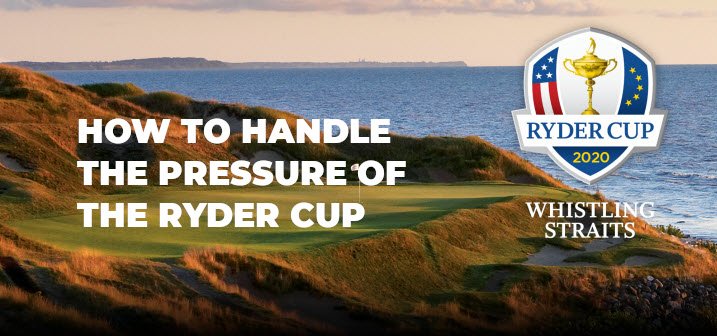
How The Players Handle The Pressure of The Ryder Cup
The Ryder Cup week is one of the most exciting events in professional sport. Major championship golf is high adrenaline stuff, but The Ryder Cup takes it to another level. Add in the team aspect, playing for your country/continent and the noisiest fans in golf and you get the high pressure atmosphere that has created so many great moments over the years. No doubt this year will be no different.
The reason we love The Ryder Cup is because of what’s at stake and watching how the players perform under the pressure. To be a successful Ryder Cup player requires a top notch mental game and proven strategies to diffuse pressure. Here are my views on what the players will have to deal with this week and the strategies they will use to adapt to it.
How does The Ryder Cup pressure affect the players?
Most players who have played in The Ryder Cup say it’s the most pressure they’ve ever played under. The pressure comes from not wanting to let down their teammates and their country, with the world of golf watching. They all want that feeling and the legacy of being on a winning Ryder Cup team, you can tell that from the passion that exudes during the 3 days.
Pressure affects us in different ways – what’s important is that you know how it affects you.
The pressure that the players will feel on the first tee of The Ryder Cup might be similar to the pressure that you’ve felt in some of your rounds. Heart racing, hands shaking, a racing mind, etc. That first tee shot will be uncomfortable, there’s no doubt about it. The key is to prepare for it and know what you intend to do. Pressure limits our ability to direct conscious thought, so you’ll need to make sure that you’ve prepared for it well. There’s no winging it when you’re playing in The Ryder Cup. What mental strategies for golf would you use?
How to deal with the pressure of the ryder cup
The brain’s default is to think of what could go wrong, so it’s important to override that by focusing on the possibility of success. Prompt yourself to think about what success looks like. Remind yourself of the times in the past that you’ve played well under pressure. Like any “big” event in your life, you’ll benefit from rehearsing it. Using mental imagery or “visualization for golf”, you can get an immersive experience that can create the feelings of pressure and you can run through in your mind how you want to behave and what actions you’ll take.
Change your perspective on pressure – it’s a privilege! The greats of the game are able to embrace it and see it as an opportunity. If you can get past those feelings of discomfort you can use the energy to your advantage.
Regulating Emotions during the ryder cup
For us spectators, watching The Ryder Cup stirs up emotions of excitement, anticipation, nervousness, shock, joy, disappointment, etc. – now imagine playing in it!
You will never be able to eliminate emotions (and in fact you wouldn’t want to) but to be a good player under pressure, you’ll need to learn how to control emotions so they don’t control your thinking and your behaviors. When emotions get too high we can act irrationally and make mistakes. If you’re too excited or too angry, you’re not going to play your best golf.
Now put that in a match play situation where you certainly don’t want to be showing your opponent the emotions you’re feeling. This is why it’s good to have a “game face” or persona that you can adopt under pressure. Neutral or positive facial expressions and strong confident body language work inwardly and outwardly, helping you feel more confident inside and at the same time letting your opponent know it.
The Team Aspect
In a sport which is very individual, for one week every 2 years the players get to experience what it’s like to play in a team – that their performance directly affects the success of others, not just themselves.
I work with many players who play on school or college golf teams, so I know all the thinking that goes on around team golf – team members can feel like they need to justify their pick to the coach and the team, there’s the chemistry (or lack of) between players and the fact that their success is less in control than it is during a normal week.
The captain’s choice of pairings will be a factor this week, both from a chemistry and strategic perspective. That said, nothing will be as important as the players being able to shut out everything before each shot, get themselves into their optimal performance state and give it 100%, regardless of the state of the match and who they are paired with or against.
This year will be usual in fact that, with the current travel restrictions, there will be few Europeans in the crowd, so it will be predominantly American fans cheering on their team in The Ryder Cup matches. That said, Europe are used to being the underdogs and have historically had a far lower average world ranking, which hasn’t stopped them coming together as a team and winning. As Sam Torrance once said, “we don’t play them on paper, we play them on grass!”
I’m very excited for this one and as always, I’ll be looking to see how the players deal with the mental challenges and pressure that comes with The Ryder Cup. Come on Europe!!!


